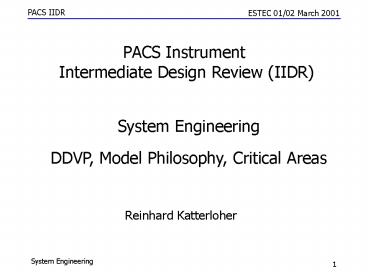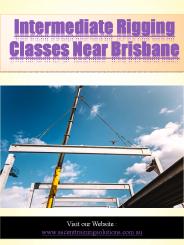PACS Instrument Intermediate Design Review (IIDR)
1 / 21
Title:
PACS Instrument Intermediate Design Review (IIDR)
Description:
PACS Instrument Intermediate Design Review (IIDR) System Engineering DDVP, Model Philosophy, Critical Areas Reinhard Katterloher Status of Instrument Design Detailed ... –
Number of Views:219
Avg rating:3.0/5.0
Title: PACS Instrument Intermediate Design Review (IIDR)
1
PACS Instrument Intermediate Design Review
(IIDR)
System Engineering DDVP, Model Philosophy,
Critical Areas
- Reinhard Katterloher
2
Status of Instrument Design
- Detailed interface requirements have been
finalised - Subsystem design has been finalised
- Detailed system design has been finalised
- Design for on-board software has been finalised
- Design of EGSE and OGSE concept have been
finalised
3
Status of H/W Documentation at IIDR
- All Specifications Documents related to
components, subunits and units are issued - Interface Requirements Doc. and all ICDs are
issued - The Instrument Requirement Doc. is issued
- The Instrument Science Requirement Doc. is issued
- DDVP is updated to final instrument design
- Test Plan (instrument AIV and calibr.) is issued
(draft) - IID-B update issued
4
DDVP and TP Main Contents
- DDVP describes the development approach according
to the system level requirements, the overall
qualification and verification concept at
subunit/unit/ instrument level. No further issues
are intended. - Individual DDVPs are issued for components,
subunits and units. They contain the relevant
detailed information and cover the DIV program
(environmen-tal and performance) until delivery
of items to MPE. - TP deals in detail with that part of DDVP which
is related to all AIV activities (environmental
and performance/calibration) on Instrument Level.
Schedules and Test Facilities are included.
5
Subsystem Verification (Qualification of Units)
6
General Instrument AIV Sequence
7
Instrument Units (Deliverables)
- 1 cryogenic FPU mounted on OB
- 8 warm electronics boxes mounted on SVM- 1 DPU
(prime and redund.)- 2 SPU (1 prime, 1
redund.)- 4 analogue electronics boxes DEC1,
MEC1 (prime), DEC2, MEC2 (redund.)- 1 analogue
box BOLC - 1 preamplifier box BOLA mounted on CVV
- 1 set of interconnecting harnesses
8
Instrument Block Diagram
9
Thermal Mathematical Model
- Upgrade of TMM performed after implementation of
bolometer assembly and according to design
progress. - New steady state conditions and transient
behavior (temperatures and heat fluxes) of all
inner parts of the FPU available. - Predictions are reliable, if the PACS TMM is
combined with the S/C cryostat TMM. - An FPU cooldown time of more than 5 days is
expected
10
Thermal Mathematical Model Schematic
11
Structural Mathematical Model
- Structural Analysis repeatedly performed after
final FPU design. Impact of improvements on parts
of FPU structure is being investigated - Resonances above 100 Hz achieved
- Values for resonance amplifications will be
available very soon giving final loads on
individual subunits (chopper, grating, detectors,
bolometer assembly, filterwheels, sources etc.) - Results under agenda point FPU Mechanics
12
Redundancy Concept
- WE units redundancy features- fully redundant
DPU, SPU, MEC- partly redundant BOLC- not
redundant BOLA, DEC (several features to
improve reliability) - FPU redundancy features (no full redundancy)-
Detectors (modules, supply groups, subarrays) -
neither optics nor mechanisms are redundant
(redundant windings and sensors)
13
Redundancy Scheme (Wiring)
14
Grounding Concept and EMC/EMI
- A final grounding concept has been achieved,
detailed diagrams are shown in document
PACS-ME-LI-006 - EMC/EMI study has started at MPE to identify and
analyse critical points of system design.
Modeling will provide EMC improvement. - Grounding and EMC issues will be presented under
agenda point Grounding Scheme
15
Model Philosophy
- Deliverable Models to ESA are AVM, CQM, PFM, FS
cold FPU (refurbished CQM) and electronics spare
kits. - For qualification of warm electronics units a QM
model is required. But, a specific PACS SPU QM
will not be built, qualification is done within
Planck Proj. - AVMs will not be returned to the PIs together
with the CQM. - For the test and calibration program (ILT) on the
refurbished CQM FS-FPU (and for the benefit of
further S/W development), all QM WE units are
needed on instrument level (missing QMs need to
be replaced by AVMs).
16
H/W Deliverables (...) means not a deliverable
17
Critical Areas
- Critical Areas regarding technology issues
- CRE redesign and manufacture of complete QM-FEE
(gt pretests on basic circuits) - Grating assembly performance (gt development
model, investigation of dry lubricants of
bearings) - Bolometer subarray manufacture
- Chopper (gt lifetime model)
- Black Paint (gt sample performance and
qualification program) - Temperature Sensors (gt qualification program)
18
Critical Areas ctd.
- Critical Areas with respect to AIV and schedule
- CRE redesign/manufacture/delivery loop
- Detector modules and array/baffle assembly
- Detector module testing (little/no margin)
- Bolometer Unit AIV
- ILTs (little/no margin)
19
CRE Risk Analysis
- Increased progress in CRE development makes a
need for replacement of CREs by TIAs in the
Photodetector Modules very unlikely - CQM detector arrays will be fitted with CREs
- TIA performance proven during QM detector module
pretests at MPE
20
Impact of TIA-Arrays on PACS performance
- In case the CRE performance is not adequate for
PACS FM , the impact is- two 25x16 (CRE) arrays
to be replaced by two 4x16 (TIA) arrays- heat
dissipation 35 mW, linear 1x4 on sky - Re-definition of spectrometer calibration and
observation, redesign DEC, S/W redesign DEC,
SPU, DPU - TIA concept is not an alternative solution, PACS
efficiency in observation time degraded
21
Summary Slide
- Redundancy Concept
- Redundancy Scheme (Wiring)
- Grounding Concept and EMC/EMI
- Model Philosophy
- H/W Deliverables (...) means not a
deliverable - Critical Areas
- Critical Areas ctd.
- CRE Risk Analysis
- Impact of TIA-Arrays on PACS performance
- Summary slides
- PACS Instrument Intermediate Design Review
(IIDR)
- PACS Instrument Intermediate Design Review
(IIDR) - Status of Instrument Design
- Status of H/W Documentation at IIDR
- DDVP and TP Main Contents
- Subsystem Verification (Qualification of Units)
- General Instrument AIV Sequence
- Instrument Units (Deliverables)
- Instrument Block Diagram
- Thermal Mathematical Model
- Thermal Mathematical Model Schematic
- Structural Mathematical Model































